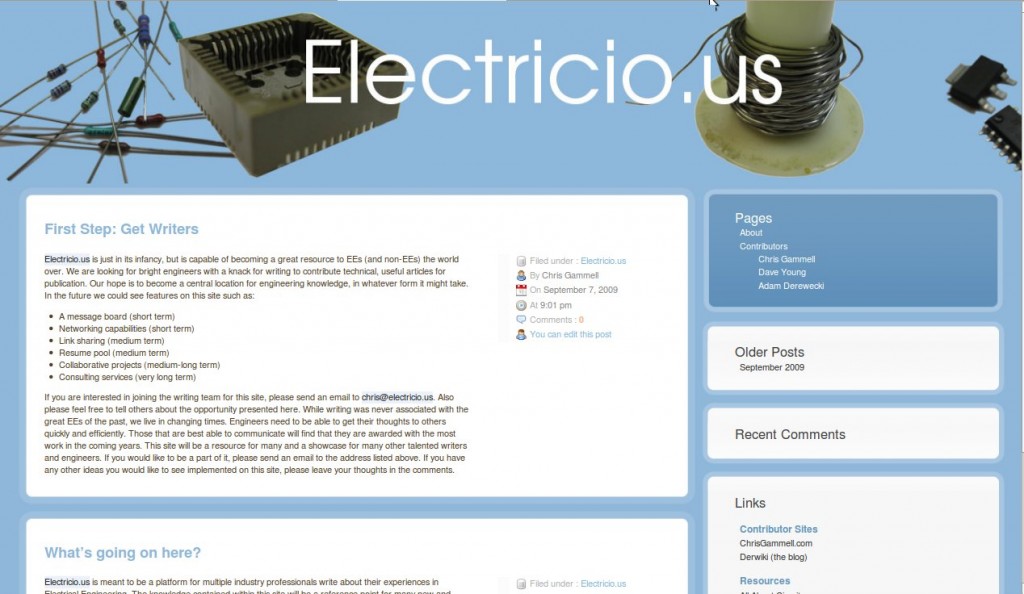Although I’ve been busy working on Electricio.us lately (thereby neglecting this site), I have been able to continue listening to my local NPR station (which, like any good nerd, I love). A program the other day spoke to a local community trying to build up the economy through the arts.
I was intrigued. I had never thought of that before. Why would anyone ever try to develop an arts community first? Where are the jobs? Well folks, we have a bona fide Chicken and Egg paradox here. It really goes both ways. What happens if a community only has day jobs and no culture? What happens if you develop a thriving arts community before there are “Economic Drivers” and jobs for people moving there? Does the absence of one element slow the growth of the other?
I would tend to think the jobs come first. And of course when I think jobs I think of technical jobs, not those silly financial jobs that got us into this mess of a recession. I mostly think of technical jobs first because I’ve never really experienced anything else and I’ve heard technical jobs can have a multiplicative effect (helping to create some of the other jobs I’m not as fond of). But what happens in locations where there are only jobs and no culture to go along with it? Who really wants to live there?
An example is contained within Eric Weiner’s book, The Geography of Bliss (which I first read about at Get Rich Slowly). He is traveling the world, looking to explain why some locales are happier than others. In the midst of his travels, he goes to Qatar (one of the richest regions in the world) where he encounters a city booming with jobs (mostly for migrant workers) to fill the “need” of those rich from petrodollars. However, he notes the absence of culture and even references how the richest from that country travel the world buying up impressive art collections in a hope to obtain culture. The result is a city full of people being shuttled to and from chain restaurants and malls, without any interesting things in between. Even the history museum is filled with artifacts toil and struggle in the desert…and not much else. Because the jobs in the region are scarce, no one really wants to be there, but no one working there can really leave.
The other extreme is when a city has a strong art and culture community but is lacking in jobs. An example is New York City in the current recession. Even though the current unemployment numbers are hovering around 10.3%, people continue to move to the city. Why? Because you can’t find many other places in the world with a similar art and culture scene. Where else can you find so many museums in a 10 mile radius? But when it comes to being practical? No, not so much. The fact that the unemployment is only 10.3% is likely because of the high costs associated with living in or even near the city.
So back to the original example. Would starting an arts community allow for eventual development of a thriving economy? It depends. Are there other nearby communities that can feed into this new community? Are those other communities lacking in culture or interesting events of their own, thereby necessitating people in that community to travel? Are there people in the existing community that will be benefactors to the new community? And most importantly, are there people willing to move to and develop a new arts and culture based community?
If there is a willing population, both moving to and surrounding a new (or revitalized) community, then I believe it would be possible to use arts and culture to build up a local economy. I think that it is a non-standard way to draw young and artistic people into a new place and to centralize events and gatherings; this, in turn, could help to draw people that aren’t contributing to the art and cultural scene directly but want to experience and patronize it. I know that Cleveland, with excessive sprawl and thinly populated suburbs, could really benefit from a community such as this (really it will be supplementing many other creative and culturally rich regions). Although the travel required between regions is undesirable, I think creating an arts community can really help to bring people together, which is really what drives economic growth over the long term. Do I think there will ever be large corporations moving in and bringing thousands of jobs to this revitalized community? No, I don’t; but that’s not really the point anyway.
I’m interested to know if anyone has heard of other communities built first around cultural and artistic endeavors that later blossomed into vibrant communities. If you have ever heard of one or have an opinion about what they’re trying in Cleveland, please leave a note in the comments.
